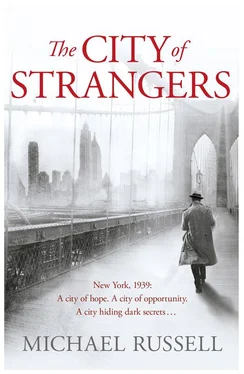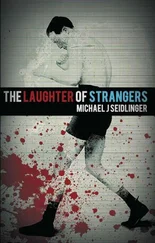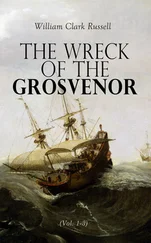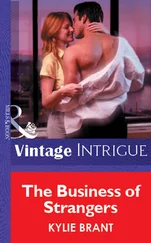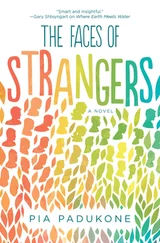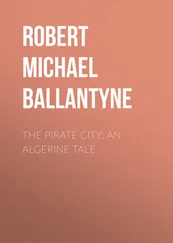He ran towards the sound, through the farmyard, past the haystacks, on to the track through the dune field, up on to the tussocky dunes. He stopped, looking out at Pallas Strand and the sea, and the crowd of people, away at the far end of the beach, where the gulls were flocking and diving and screeching overhead.
He ran towards the crowd; twenty-five, thirty people in a loose group. Some stood silently, looking towards the sea, away from something. Some stood with their heads bowed in prayer. Some were simply staring down at the sand. No one seemed to see him coming. As he reached the crowd and pushed through the onlookers, still none of them seemed to notice him.
His father’s head and shoulders rose out of the sand of Pallas Strand.
He had been buried up to his chest; his hands were by his side, somewhere beneath the sand. His head was facing out towards the sea. And where his eyes had been there were two pits of black and red pus.
The boy stared, not able to understand what he was looking at. It wasn’t real; it wasn’t a real thing at all. The first thing that came into his head was the face of the vampire he had seen at the cinema in Castleberehaven, when he had crept in at the back with Danny Mullins during Nosferatu a month ago; they had watched in open-mouthed awe, for all of five minutes, before they were yanked out by the ears. But he knew what he was looking at, of course he knew. And then it was gone. His uncle’s coat dropped over the head and covered it, and suddenly, as if a still photograph had sprung to life, everyone saw him.
His mother turned and came towards him. He didn’t see her; he was still staring down at the sand and the coat that covered his father’s head. She pulled him to her, standing between him and his father’s body, folding him in her arms before she pulled him away. He didn’t resist as she led him back towards the farm.
He didn’t even try to look back.
No one would let him look at his father’s face again. On the day of the removal, when the coffin rested all day in the farm’s best room and friends and neighbours walked from all around to drink tea and shake his hand, his mother’s hand, his uncle’s hand, the coffin would be shut. But in reality he would always see it; the black tears of blood on the wet cheeks. And as he walked silently along the strand with his mother now, the gulls were still screaming and baying for the feast they had been driven away from.
His father had died a hero. But life had to continue; there was a farm. Yet down the years of growing up in the farm behind Pallas Strand, he saw his father’s face whenever he heard the sound of hungry gulls. And though he had been told a thousand times that his father was already dead when the Free State soldiers buried him there, as a reprisal for the dead Free State sergeant at Derrylough, and as a brutal warning, he would still wake at night in terror, from dreams in which he couldn’t move his body, his legs, his arms, and he felt himself gazing helplessly at the waves moving towards him across Pallas Strand, where no one could hear his screams over the wind roaring in the darkness.
Grief would be softened as the years went by, but not rage. It was a secret strength. Rage had to be nurtured; there was a time to use it.
2. Fulton Market
New York, March 1939
In the Fulton Fish Market, below the Brooklyn Bridge on the Manhattan side of the East River, an Irishman was sitting at a coffee stall. He was a little over forty; tall, fair, with a little bit more weight than was entirely good for him. It was eleven o’clock in the evening and the place was gearing up for the night, as it did every night, its busiest time. It was as cold inside as it was outside. Lights shone fiercely over the stalls stretched out in every direction, but wind from the East River blew in through the open doors, and the crushed ice that was everywhere made it even colder. Fish was still arriving, in boxes and baskets, carried by porters and piled high on the forklift trucks that raced along the market aisles, blasting horns.
The air reeked of blood and the sea; the floor swam with melting ice and fish guts; the occasional live eel squirmed between the stalls, struggling for the doors and the smell of the East River beyond. The price of fish was shouted out with competing, overlapping cries that echoed endlessly round the building. The prices were called in English, but the profanities that accompanied them were in all the languages of New York: English, German, Yiddish, Italian, Greek, Chinese, Spanish, Polish, Russian, Armenian; like the varieties of fish, no one could count them all.
Captain John Cavendish, of the Irish army, Óglaigh na hÉireann, had been in New York for the last two months as an advisor on security during the construction of the Irish Pavilion at the World’s Fair, across the river in Long Island’s Flushing Meadows. He had also spent some of his time talking to the American army about weapons and training and munitions, and was compiling a report on all this to take back to Ireland. As far as both the ambassador in Washington and the consul general in New York were concerned, his previous role as an officer in Military Intelligence, G2, had nothing whatsoever to do with his presence in America. The fact that he was in New York at all, where the current IRA bombing campaign against Britain, now in full if ineffective swing, had been largely planned and financed, was no more than a coincidence.
It was a coincidence too that he was in New York while the IRA’s chief of staff was in America, selling not only the new war against the old enemy, but the idea that the bigger war that had to come, sooner or later, between Britain and Germany, would bring the IRA back to a position of power in Ireland itself. It would be a war that would chase England out of the corner of Ireland it still held on to; it would put an end to the toadying Free State that had found the temerity, under the leadership of the Republican turncoat Éamon de Valera, to almost call itself a ‘republic’; and it would reunite the island of Ireland.
Captain Cavendish perched on a stool at the coffee stall counter. He wore a dark grey lounge suit, a blue shirt, a silver tie, a navy blue overcoat and a pale grey fedora. He should have looked out of place among the porters and stallholders in Fulton Market, but nobody took any notice. The man he was chatting amiably to at the counter ought to have looked equally out of place, in a black cashmere overcoat and a black homburg, a half-smoked cigar clamped between his teeth. But men in overcoats and hats were no strangers to the market in the middle of the night; it was run by the Mob, after all, and the men in overcoats took a cut on every box of fish that came in and went out.
The man John Cavendish was talking to carried a .38 under his jacket, and he was important enough that the man in the brown homburg who had come into the market with him, and was now helping himself to boiled shrimps from the next stall, carried a .45 to make sure his boss had no need to use his .38. The man in the black homburg raised his hat to the captain and walked away, followed by his protection. He had a word for every stallholder he passed; the replies all contained the word ‘mister’.
John Cavendish looked at his watch; the man he was meeting was late. He had a good idea why and he didn’t much like it. But he had no choice but to wait. The army officer held out his empty coffee cup for a refill. And he liked the market. It was an old building that offered relief from the streets of towers and skyscrapers that stretched through Manhattan. It was a manageable place. It reminded him of the South City Markets in Dublin; it had the same red brick, the same arched windows, the same broken gabled lights in the roof, the same vaulting interior and battered, shabby, workaday appearance. Living in the future, as he had been told he was many times since arriving in New York, he liked to touch the past.
Читать дальше
